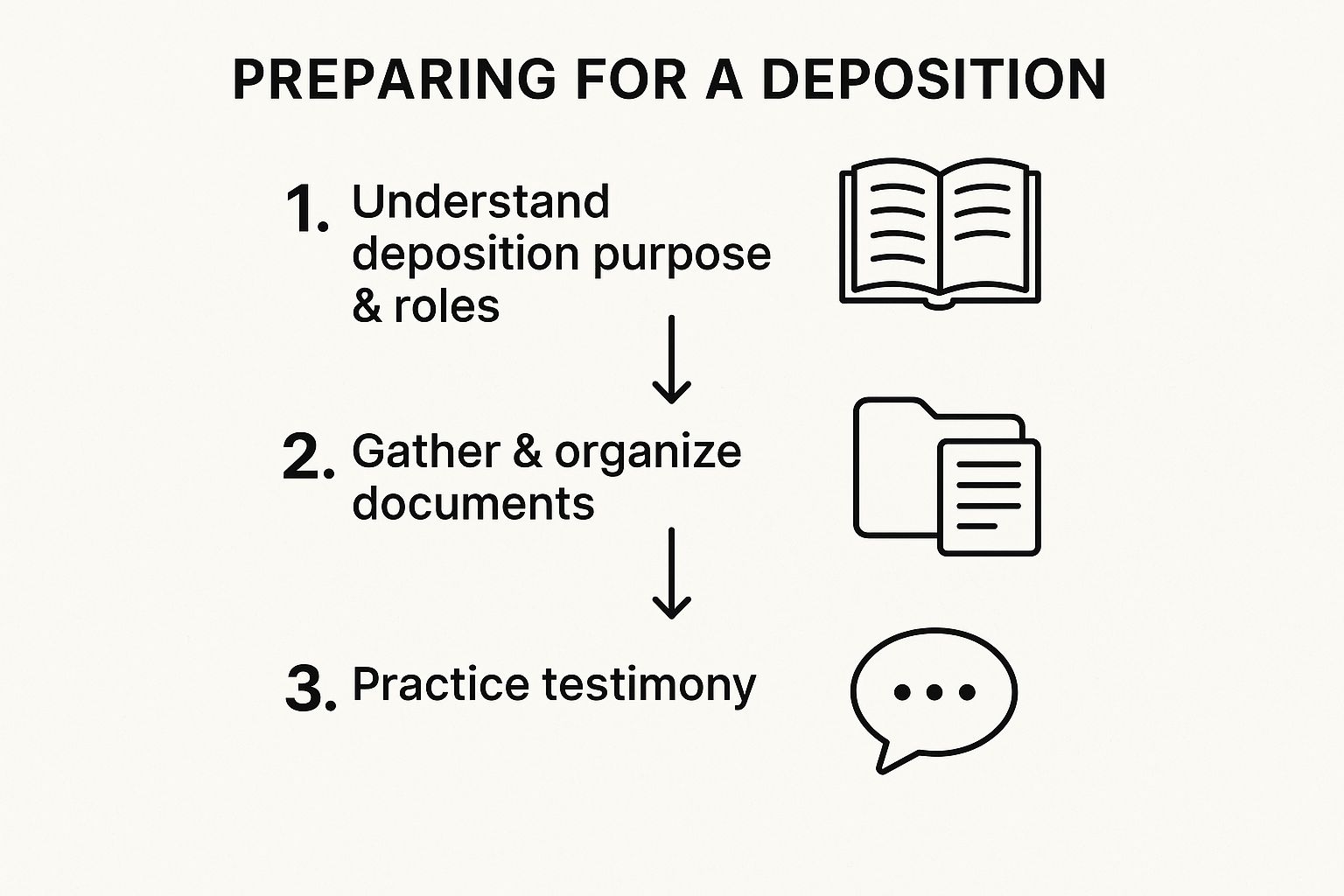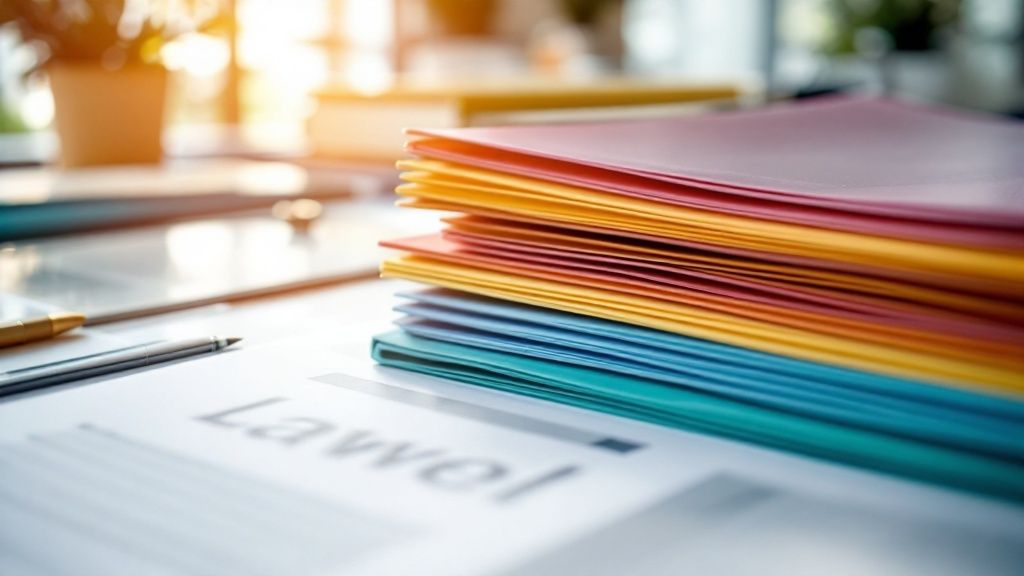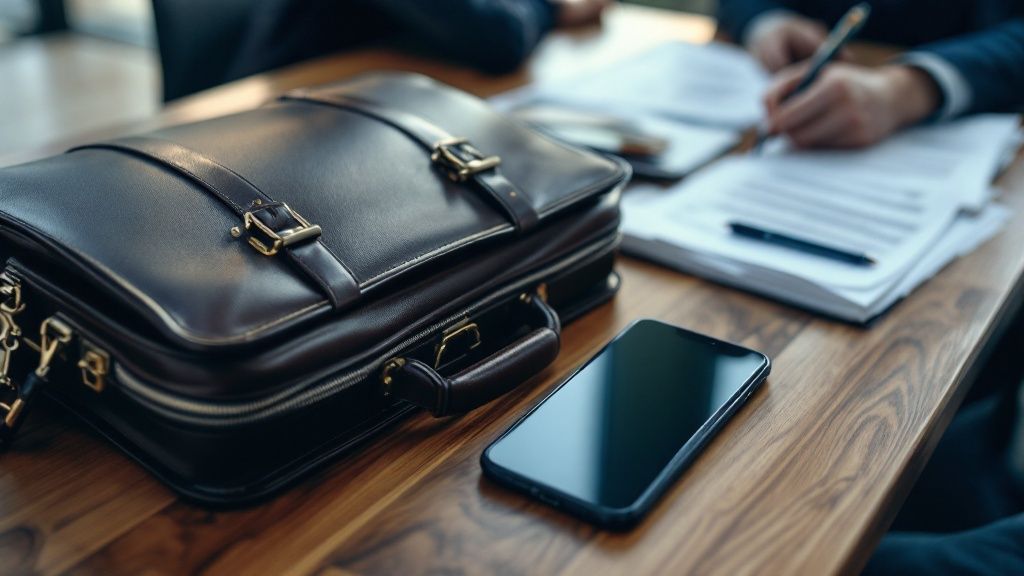How to Prepare for a Deposition A Practical Guide
"I was satisfied once John Bell took over my case."
"Communication was always timely."
How to Prepare for a Deposition A Practical Guide
Getting the news that you're going to be deposed can be a real gut-punch. It’s a nerve-wracking prospect for anyone. But the key to walking into that room with confidence isn’t just knowing your case—it’s knowing how to prepare.
Think of it as breaking down a mountain of a task into three manageable first steps: digging into the case details with your lawyer, getting your documents in order, and truly understanding what the other side wants to accomplish with their questions. This early work is what turns that initial anxiety into a feeling of control.
Getting Started Without Getting Overwhelmed
Let's clear something up right away: a deposition is not a trial or a cross-examination in a courtroom. It's a fact-finding exercise that happens under oath as part of the "discovery" phase of a lawsuit. The other side’s lawyer just wants to figure out what you know.
Your job isn't to win the case in that conference room. It's simply to give honest, consistent answers that support your side of the story. The best way to start is by focusing on what you can control right now.
This is all about laying a solid foundation for your testimony. Don't get lost worrying about every hypothetical question you might be asked. Instead, concentrate on concrete tasks that will pay off big time. This is also the point where having the right professional in your corner is non-negotiable. For example, knowing when to hire a discrimination lawyer is a critical decision for anyone facing a workplace dispute, ensuring you have an expert guiding you from the very beginning.
Your Immediate Action Plan
What you do in the first few days after getting that deposition notice matters most. These actions set the tone and create the foundation for everything you'll do with your attorney later.
- Gather Every Document: Start collecting every single piece of paper and digital file related to your case. This means emails, reports, text messages, contracts, even handwritten notes. Don’t try to edit or decide what’s important—that’s your lawyer’s job. Just gather it all.
- Write Your Own Timeline: Sit down and map out the sequence of events from your point of view. Putting it all in chronological order is a powerful way to jog your memory about key dates, conversations, and decisions.
- Book Time With Your Lawyer: Call your attorney immediately. Get dedicated prep sessions on the calendar. This is not optional; it’s where you and your lawyer will map out the game plan.
Your deposition is a marathon, not a sprint. The early preparation you do—organizing your thoughts and documents—is like your training. It ensures you have the stamina and clarity to handle whatever comes your way on deposition day.
When you're preparing for a deposition, it's easy to feel overwhelmed. This simple checklist breaks down your first critical steps into a clear, manageable plan. Tackle these tasks right away to build a strong foundation with your legal team.
Immediate Deposition Preparation Checklist
| Contact Your Attorney | Establish a game plan immediately. | Call or email to schedule your first prep session. Don't wait. |
| Centralize Documents | Create a complete file for your lawyer. | Gather all related emails, texts, reports, and records in one place. |
| Create a Timeline | Refresh your own memory of the facts. | Write a chronological list of key events from your perspective. |
| Review Case Pleadings | Understand the core legal claims. | Ask your lawyer for the complaint and answer to read through. |
Completing this checklist puts you in a proactive position. You're not just waiting for instructions; you're actively contributing to your own defense.
Think of it like this: you're assembling all the puzzle pieces before you and your lawyer sit down to put the picture together. When you walk into that first prep meeting with an organized file and a clear timeline, you make the entire process more efficient and effective. You become a partner in building your case, not just a witness. That shift in mindset is powerful and puts you in a much stronger position before you ever sit down at the deposition table.
Building Your Case Story with Your Attorney
Once you have your documents in hand, the real preparation starts. This isn't about memorizing lines like you're in a play. It's about sitting down with your attorney and piecing together a clear, consistent narrative—your case story. This story is the bedrock for every single answer you'll give.
Think of it this way: the other side's lawyer is trying to build a puzzle with your testimony. If your answers are all over the place, they can twist those pieces into any picture they want. But if every answer is grounded in one central, truthful story, the puzzle only fits together one way: the right way.
This means we're doing more than just reviewing dates and times. We’re identifying the core themes of your case, figuring out where you stand strongest, and being brutally honest about any potential weak spots.
The infographic below gives a great high-level view of this process, showing how everything from document review to practicing your testimony flows from a solid understanding of your case.

As you can see, gathering the evidence and practicing your testimony are connected by one essential goal: building that core case story.
Uncovering the Narrative in Your Documents
Your attorney will help you look at your documents with a new perspective. An email isn't just an email anymore; it’s a timestamped piece of your story. A contract isn't just a wall of text; it's a record of promises that set the stage for everything that happened next.
Together, you and your lawyer will:
- Create a Master Timeline: We'll merge your personal memories with the hard dates on documents to build a definitive sequence of events. This is invaluable for organizing the facts and spotting any gaps or contradictions we need to get ahead of.
- Find the Key Communications: Not all emails are created equal. We'll zero in on the "pillar" documents—the messages that will almost certainly be the focus of the other side's questions.
- Link Actions to Outcomes: The goal is to draw a straight line from one event to the next. For instance, how did that specific email exchange in March directly lead to the decision made in April? This helps you explain your thought process in a logical, defensible way.
Your case story is your North Star. Every answer you give should point back to the core truths of that narrative. When the opposing lawyer tries to confuse you or pull you off track, you can always return to the simple, consistent facts.
This isn't just a theory; it works. My experience, and plenty of research, shows that this kind of systematic, story-based preparation makes a huge difference. In fact, a structured approach can often shorten the deposition itself by 20-30% simply by keeping the testimony focused and efficient.
Pinpointing Strengths and Confronting Weaknesses
Let's be realistic: no case is perfect. A huge part of building your story is being honest about the high points and the potential trouble spots. Your attorney is your trusted confidant here, so you need to be completely transparent.
During this stage, we’ll talk through:
- Your Strongest Points: What facts, documents, or moments make your case crystal clear? These are the pillars of your story that you'll state with complete confidence.
- The "Bad" Facts: Are there any emails you regret sending? Moments where your memory is a bit hazy? Events that seem to contradict your main point?
The temptation is always to hide or downplay these weaknesses. That's the biggest mistake you can make. The opposing counsel’s entire job is to hunt for these issues and blow them up. By tackling them head-on with your attorney beforehand, you can prepare honest, straightforward explanations. This completely deflates those "gotcha" moments they're hoping for.
This type of preparation is critical for the entire legal journey. You can get a better sense of the bigger picture by understanding the full personal injury claim process.
Ultimately, this collaborative work turns you from a nervous witness into an active, confident partner in your own case. You'll walk into that deposition room not with a script, but with a deep understanding of your own story and the ability to tell it truthfully.
Mastering Your Testimony in Practice Sessions
Think of your lawyer as your coach and your prep meetings as the training ground. This is where you put theory into practice, building the mental muscle memory you’ll need to deliver clear, confident testimony when it counts. These sessions aren't just about reviewing a stack of papers; they’re about simulating the real thing to get you ready for the pressure, the tactics, and the unique environment of the deposition itself.
The whole point is to take the mystery out of the process. By the time you walk into that conference room for the real deposition, the setup should feel familiar. You'll have already fielded tricky questions, practiced keeping your cool, and mastered the art of being a solid witness.

The Power of the Mock Deposition
Without a doubt, the most powerful tool in your prep sessions is the mock deposition. Your attorney will step into the role of the opposing counsel, hitting you with the same kinds of tough, pointed questions you're likely to face. It can feel a little awkward or even intense at first, but this dry run is absolutely invaluable.
This practice run accomplishes a few critical things:
- It Shines a Light on Your Habits: Do you tend to get defensive? Do you ramble when you get nervous? A mock deposition brings these natural reactions to the surface so you can recognize and manage them.
- It Tests What You Really Know: It becomes very clear, very quickly which parts of your story you know inside and out, and which areas are a little fuzzy. This helps you focus your review on the details that truly matter.
- It Builds Your Mental Stamina: Getting grilled for hours is exhausting. A practice run helps you build the endurance to stay sharp from the first question all the way to the last.
The deposition room is the last place you want to be hearing a certain type of question for the first time. Mistakes made in a practice session are free lessons; mistakes made when the court reporter is typing are costly.
The feedback you'll get is immediate and specific. Your lawyer will hit pause to point out when you volunteered too much information, fell for a leading question, or rushed an answer without thinking. This is how you truly build confidence for the real thing.
Learning the Golden Rules of Testifying
During your practice, your attorney will drill you on the absolute fundamentals of giving testimony. These rules aren't complicated, but they take real, conscious effort to stick to when you're under pressure. Think of them as your personal guidelines for every single answer.
1. Listen to the Entire Question The single most common mistake I see witnesses make is answering the question they think the lawyer is asking. Opposing counsel will often use long, winding questions to try and trip you up. Your only job is to wait until they have finished speaking. Completely. Don't even start thinking about your response until their mouth has closed.
2. Pause Before Every Single Answer That little moment of silence is your best friend. It gives you a beat to actually understand the question, think through your answer, and make sure it’s accurate and concise. Just as important, it gives your attorney a chance to object if the question is out of line. Never let the other lawyer rush you—you control the pace with a deliberate pause.
3. Answer Only What Was Asked Fight the natural urge to explain, justify, or give extra background. If the question can be answered with a simple "yes," "no," or "I don't recall," stop there. Volunteering extra information is like handing the other attorney a shovel to dig for more. If they need more details, believe me, they will ask for them.
Handling Tricky Questioning Tactics
Opposing counsel comes equipped with a whole toolbox of questioning techniques designed to get you off-balance or elicit a certain response. Practicing how to handle these is a game-changer.
You'll rehearse your responses to a few common types:
- Leading Questions: These questions suggest the answer the lawyer wants (e.g., "You weren't paying very close attention to the road at that point, were you?"). Your job is to firmly disagree with the premise if it's not true, rather than just accepting their version of events.
- Compound Questions: This is basically two or more questions crammed into one (e.g., "When you left the meeting, were you angry and did you immediately call your supervisor?"). Your lawyer will coach you to politely break it down and answer each piece separately.
- Hypothetical Questions: These are questions that ask you to guess or speculate ("What would you have done if...?"). The right response here is almost always to state that you can't guess and can only testify about what actually happened.
The skills you build in these sessions are invaluable, not just for a deposition but for any formal proceeding. In fact, many of these same principles are crucial when you prepare for a disability hearing, where clear and concise testimony can make all the difference.
Ultimately, this preparation transforms the deposition from a scary, unknown ordeal into something you can manage. You’ll learn firsthand that simple, truthful answers are always the best answers and that you have all the tools you need to stay in control.
What to Expect on Deposition Day
Walking into a deposition can feel intimidating, but a lot of that anxiety comes from the unknown. Once you understand the setup, the people involved, and the basic rules of the road, that fear disappears. You can then stop worrying about the process and focus on what matters: your testimony. Let's pull back the curtain on what the day will actually look like.

First, forget what you’ve seen on TV. Most depositions don’t happen in a dramatic, wood-paneled courtroom. Instead, you'll likely be in a standard conference room at one of the law firms or a neutral court reporting office. It’s a professional setting, but far less formal than a trial.
Who Is in the Room
When you sit down at the conference table, you’ll see a few key players. Knowing who they are and what they do is the first step to feeling in control.
- Your Attorney: This is your anchor. They’ll be sitting right beside you, ready to protect your interests, object to improper questions, and give you a moment to regroup if needed.
- Opposing Counsel: This is the lawyer for the other side. They are the one who will be asking you questions, and their goal is to gather facts that help their client's case.
- The Court Reporter: This person is the official record-keeper. They use a stenotype machine to create a word-for-word transcript of everything said while "on the record."
- A Videographer (Sometimes): In some cases, your testimony will also be video-recorded. If so, a videographer will set up a camera to capture a visual record.
Understanding Key Deposition Procedures
Beyond just the people, a few standard procedures kick things off. They might seem like mere formalities, but they are important.
It all starts with the oath. The court reporter will ask you to swear or affirm that you will tell the truth. This is serious—it carries the same legal weight as testifying in front of a judge.
After the oath, the opposing lawyer will usually run through some ground rules. They’ll say things like, "Let me know if you don't understand a question," or "Please wait for me to finish my question before you answer." Pay close attention to these instructions.
A deposition is a controlled, formal conversation, not an interrogation. Your calm demeanor, professional attire, and clear communication are subtle but powerful tools that influence how your testimony is perceived.
The Flow of the Deposition
Once the questions start, a few things can happen that might throw you off if you aren't prepared.
Going "On and Off the Record" The court reporter only types when the lawyers agree to be "on the record." If your attorney needs a private word with you or wants to argue a legal point with the other lawyer, they’ll say, “Let’s go off the record.” The reporter stops typing, and that conversation is not part of the official testimony.
Handling Exhibits At some point, the other attorney will likely hand you documents, photos, or other items. These are called exhibits, and each one will be marked for the record (e.g., "Plaintiff's Exhibit 1"). You have the right to review any exhibit completely before you answer a single question about it. Take your time.
When Your Lawyer Objects Don't be alarmed when you hear your lawyer say, "Objection." It’s a normal part of the process. An objection is simply a formal way of flagging a question that might be confusing, irrelevant, or asks you to guess about something you don't know.
After objecting, your lawyer will give you a clear signal on what to do next:
"You can answer." This means the objection was just to preserve the issue for the record, but you should go ahead and answer the question.
"Don't answer that question." This is a direct instruction. If you hear this, you must stop and not answer.
These are the nuts and bolts of any deposition. By understanding them before you walk in the door, you can focus on the most important part of the day—giving clear, honest, and accurate testimony.
Navigating International Deposition Challenges
When your case crosses international borders, the deposition process you know gets thrown out the window. What’s a routine procedure stateside can quickly become a minefield of logistical headaches, cultural friction, and clashing legal systems. Taking a deposition abroad isn’t just a change of scenery; it requires a whole new level of planning and foresight.
Forget your standard checklist. You're suddenly juggling different time zones, potential language barriers, and legal protocols that can change dramatically from one country to the next. Pulling this off successfully comes down to obsessive advance planning and bringing in professionals who live and breathe international legal services.

The Legal and Logistical Hurdles
The first wall you’ll hit is understanding the host country's rules. You can't just book a conference room and fly in. Some nations have incredibly strict regulations about foreign legal proceedings happening on their soil.
For instance, in some countries, the only legally acceptable place to hold a deposition is at a U.S. embassy or consulate. That means you’re dealing with State Department procedures and a mountain of bureaucracy that needs to be handled weeks, if not months, in advance. One wrong move, and the entire deposition could be invalidated, flushing huge amounts of time and money down the drain.
On top of that, you have to assemble the right team on the ground. This isn't easy. You'll need:
- A Certified Interpreter: This isn’t a job for a bilingual colleague. You need a professional who is an expert in legal terminology and the subtle art of deposition interpretation.
- A Qualified Court Reporter: Finding a reporter who understands U.S. deposition formats and is comfortable with the necessary tech can be a real challenge in many parts of the world.
- A Legally Compliant Location: The room itself has to meet the legal standards of both the U.S. and the host country for the testimony to hold up in court.
Preparing for an international deposition isn't just about booking flights and a conference room. It's a high-stakes diplomatic and legal exercise where one misstep can jeopardize your entire case. Meticulous planning isn't a suggestion; it's a requirement.
Why Advance Planning is Non-Negotiable
I can't stress this enough: you need a lot of lead time. With international litigation on the rise, the demand for these specialized services is high. A 2018 survey found that 45% of U.S. companies were dealing with legal issues that involved cross-border discovery, which shows just how common this has become.
Legal experts will tell you to schedule international depositions at least six to eight weeks out. This gives you a realistic window to lock down qualified people and suitable facilities, which are often in short supply. You can find more practical advice by reviewing some insights on conducting international depositions.
This extended timeline is your best friend. It gives you the breathing room to properly vet interpreters, confirm the legal status of your chosen venue, and get any necessary permissions from foreign governments. Trying to rush this is a surefire way to end up with a canceled depo, inadmissible testimony, or worse, legal trouble in the host country. The smartest move is to partner with an experienced international legal service provider to sidestep these costly mistakes and make sure your deposition is a success.
What Happens After the Deposition? Reviewing Your Transcript
You’ve made it through the deposition. That’s a huge step, but the process isn’t quite over yet. What comes next is just as important: reviewing the official transcript.
A court reporter will type up every single word said during the deposition, creating a document that becomes the official legal record of your testimony. You'll get a chance to read through it and make sure it’s 100% accurate. This isn't a do-over or a chance to change your answers, but it is your one opportunity to fix any errors made by the court reporter.
The Errata Sheet: Your Tool for Corrections
Along with the transcript, you’ll receive an errata sheet. This is essentially a log where you'll list any corrections. It’s a formal, legally recognized way to fix mistakes in your sworn testimony.
Sit down with your attorney and comb through the transcript, page by page. It’s tedious work, but you're looking for subtle errors that could have a massive impact.
Keep an eye out for things like:
- Simple typos: A misspelled name or the wrong street can create unnecessary confusion down the line.
- Factual mistakes: Getting a number or a date wrong could skew the timeline of events.
- Crucial mistranscriptions: The difference between "I did" and "I didn't" is everything. A single mistyped word can completely flip the meaning of your testimony.
For every correction, you’ll note the page and line number, write down what it currently says, and then provide the correction. Don’t make any changes without talking to your lawyer first. They’ll help you decide what’s a necessary fix versus what might look like you’re trying to change your story after the fact.
Think of it this way: when you sign off on that transcript—with or without corrections—you are swearing that every word in it is true and accurate. Don't rush this final check. A small mistake left uncorrected can undo all your careful preparation.
Once you and your attorney finalize and submit the errata sheet, the transcript becomes a powerful tool. It can be used in settlement talks or even read to a jury if your case goes to trial. Taking the time to get it right protects you and ensures the official record is spotless.
Answering Your Top Deposition Questions
Even with the best preparation, a few nagging questions always seem to pop up right before a deposition. Let's tackle some of the most common ones I hear from clients. Getting these details ironed out can give you that extra bit of confidence when you walk into the room.
Think of this as our final huddle, making sure you're solid on the small stuff that can otherwise cause last-minute anxiety.
What Should I Wear?
My advice is always the same: dress like you're going to court. You can't go wrong with business casual. Think slacks and a button-down shirt or blouse, or a professional dress.
The goal is to look like you're taking this seriously, not to make a fashion statement. I'd steer clear of anything that might pull focus, such as:
- Clothing with big logos or loud graphics
- Flashy jewelry or strong fragrances
- Anything overly casual like t-shirts, jeans, or shorts
A clean, professional appearance subtly reinforces your credibility before you even say a word.
Can I Bring My Own Notes?
This is a big one, and the answer is almost always no. You shouldn't bring any personal notes with you. The reason is simple: if you look at a document to answer a question, the other attorney can demand to see it. It instantly becomes an exhibit.
Your prep sessions with your lawyer are where the work happens. The goal is to know your story inside and out, not to rely on a cheat sheet. Bringing notes risks handing the opposing counsel a playbook of your legal strategy.
What Happens If I Don’t Know an Answer?
It is completely fine—and often the smartest move—to simply say, "I don't know" or "I don't recall right now." Whatever you do, don't guess or make something up. A wrong answer, even an innocent one, can be used to attack your credibility down the road. An honest "I don't know" is always better.
Your testimony is about what you personally know and remember. Stick to that, and you'll be fine.
This same principle of sticking to the facts is vital in other parts of a case, too, like when you're learning how to negotiate an insurance settlement. It's also worth remembering that where the deposition happens matters. Some countries have very specific rules. For instance, you can’t just conduct a deposition in China, and in Japan, it often has to take place at the U.S. Embassy. You can read more about these global deposition rules on PlanetDepos.com.
At Bell Law, we know a deposition is just one piece of the puzzle. If you've been injured and need a guide for the entire legal journey, from filing the first papers to reaching a final settlement, contact us for a consultation at https://www.belllawoffices.com.
Disclaimer: The information on this page is provided for general informational purposes only and is not legal advice. Reading this content does not create an attorney-client relationship. For advice about your specific situation, please contact a licensed attorney.







